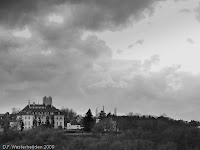Every now and again the discussion flares up: is post-processing of photos allowed? The main problem is of course that "the belief remains that
when there are no obvious clues concerning image manipulation, the image must depict reality" as a student in Media from Amsterdam, Alexander van Dongen, wrote in his 2006 thesis, which I stumbled upon
in the Net. At the same time: the charm of photography is precisely its 'believability', its truth-likeness. It would not be fun if viewers did not believe that the photo was real.
To me the issue remains contextual--and then it's simple: if you want to convey a message of reality, then no fooling around is allowed beyond general interpretation of the sensor data (i.e. making truthlike colours by adjusting the white-balance, adjusting erroneous exposure and the like). If the aim is just to please the viewer's eye, then all is allowed.
But we don't believe in the self-organising force of the market anymore: it has become only too clear that markets may be good at coordinating supply and demand of simple goods, but when cheating is possible, it will happen, so that controls on honesty are necessary. Newspaper editors, photo award juries etc. are the public's agents in that respect. How they make their "contracts" with photographers, may be an interesting question for researchers of property rights theory, or principal-agent theory. For me the poitn is: I want to trust my newspaper--and I want to enjoy pictures at an exhibition for what they are.
 "It must be great to travel so much!", is what people sometimes say to me. To counter the idea that travel for work is as nice as traveling for pleasure, I once started to make a series of depressing photos from my hotel windows in famous cities--often the only thing I'd see, apart from conference rooms, airports, and the (traffic-laden) road in between. That series started in the days of analogous photography (but was not kept well-organised), and sometimes I still add to it. Prague is a great city to add to that series of sadness: although much has been restored since I first saw the city, just after the Fall of the Wall, there still are views of "maintenance wanted" situations and one of those was right opposite my hotel room, across a narrow street in the Old Town.
"It must be great to travel so much!", is what people sometimes say to me. To counter the idea that travel for work is as nice as traveling for pleasure, I once started to make a series of depressing photos from my hotel windows in famous cities--often the only thing I'd see, apart from conference rooms, airports, and the (traffic-laden) road in between. That series started in the days of analogous photography (but was not kept well-organised), and sometimes I still add to it. Prague is a great city to add to that series of sadness: although much has been restored since I first saw the city, just after the Fall of the Wall, there still are views of "maintenance wanted" situations and one of those was right opposite my hotel room, across a narrow street in the Old Town. This time, the trip had its nice, touristy moments: we had some time to enjoy the panoramas of the city. Can you spot the post-processing, apart from the obvious cropping? I guess you can: in both cases I made the sky more 'dramatic' by reducing the exposure locally by about one stop. Of course I tried to make the effect as much as possible look as if I had used a graded neutral density filter.
This time, the trip had its nice, touristy moments: we had some time to enjoy the panoramas of the city. Can you spot the post-processing, apart from the obvious cropping? I guess you can: in both cases I made the sky more 'dramatic' by reducing the exposure locally by about one stop. Of course I tried to make the effect as much as possible look as if I had used a graded neutral density filter. By the way, these pictures were taken with a normal compact camera (it is not worthwhile carrying the DSLR for those few photo occasions). I am quite satisfied with the results of the Lumix TZ-5: good colour rendition, good resolution. Too bad it's all in Jpeg, though.
By the way, these pictures were taken with a normal compact camera (it is not worthwhile carrying the DSLR for those few photo occasions). I am quite satisfied with the results of the Lumix TZ-5: good colour rendition, good resolution. Too bad it's all in Jpeg, though.

